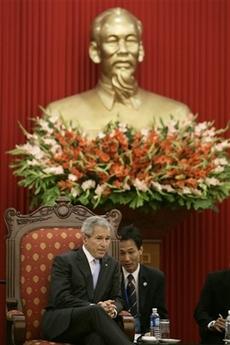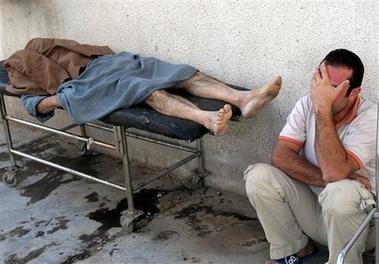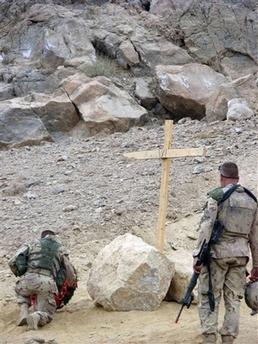Despite all the conversation among US politicians and "experts" as to what to do in Iraq, the reality is that at this point the US has very little impact upon the inertia of the country.
After Forward Together failed, it became apparent that the best the US could hope to do was shunt violence out of focus areas. Any hopes of a near term creation of a viable Iraqi security force who would fight "non-demoninationally" has pretty much evaporated.
With Maliki repeatedly ignoring US calls to disband the militias, and the escalating violence making a political settlement impossible, the US's relative influence on the political process has been reduced to ineffective persuasion.
And, with the choas in the streets, and the corruption in the government, any hope of an economic revival appears no more than a dream.
These were the three pillars of the Bush administration's "Strategy for Victory," and each one has been shattered in turn. The US, within the confines they've set, has not been able to significantly alter the trajectory of events on any of these fronts.
The US is no longer controlling events in Iraq.
Assuming the US is not going to stay in its current ineffective limbo, and Maliki is unwilling to go against the militias, what's left as an option?
I see three broad brush possibilities. 1) Straight out withdrawal either quickly or slowly. 2) Allow Maliki and the Shias to keep their militias and assist them in dominating the country. 3) Take on the Shia militias directly, and undermine the Maliki government.
I don't like any of these very much, and I think you can pretty much rule out number three because of the cost in casualties and the political anarchy that would come from undermining Maliki, the devil we know.
So, it's either help Maliki become a soft dictator, maybe just by standing aside, or leave and let the Shia fight amongst themselves for their own choice. This is the direction of Iraq's inertia. (With this probable outcome, it is imperative that the US hold talks with Iran as Iran will be the main outside influence on the shape of the Shia structure.)
Baker's ISG does not have a magic wand to wave, or a time machine to travel back to 2003 when the US still held cards in its hand. It is looking at these same choices. And with the Bush administration ruling out withdrawal, the "Stability First" option is really the only way the US will go forward. So, beyond the political cover offered by the ISG report, what are they waiting on? (There is already
some evidence that the administration is fixing itself towards this new direction.)
At this point, I see it primarily as a question of how the impacts of this will play out regionally and how many graves will have to be dug before this happens. This is what's coming.
(
Also: Take a moment to note Richard Haass' statement answering the question, "Is Iraq still winnable for the United States?"
Haass: We've reached a point in Iraq where we've got to get real. And this is not going to be a near-term success for American foreign policy. The Iraq situation is not winnable in any meaningful sense of the word "winnable." So what we need to do now is look for a way to limit the losses and costs, try to advance on other fronts in the region and try to limit the fallout of Iraq. That's what you have to do sometimes when you're a global power.
Haass is the president of the Council on Foreign Relations, so when he says something like this, even far away from the American press, it means something. I wouldn't expect too many serving politicians to take up this line because of the politics of it, but Haas has broken the taboo here, and I would expect others to follow, introducing this idea into the American Iraq dialogue.)























